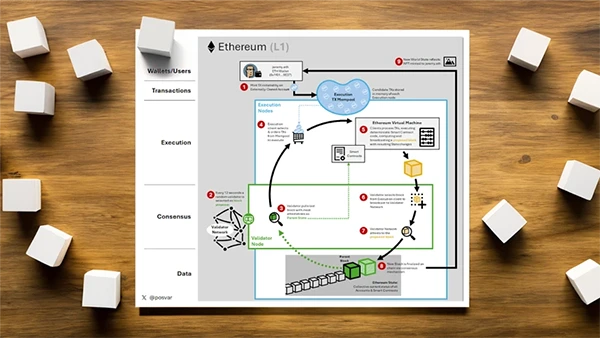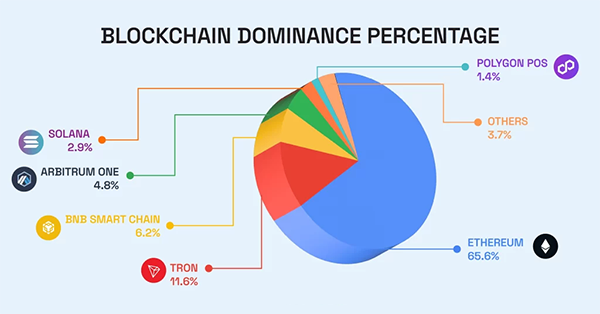Can Ethereum Improve Its Blockchain With Smart Accounts?

Ethereum, the most popular blockchain platform, has made several valuable changes including changing its use of Proof of Work to Proof of Stake in order to get to that level.
This transition was possible with the help of the Ethereum 2.0 upgrade, which is still in progress to be adopted by the platform.
Besides this upgrade, the blockchain has also prepared several improvements that will accelerate customer retention for the network and benefit the efficiency of the network.
According to Binance, this platform was created in 2015 and it is a decentralized network means that the platform is not controlled by any governing body.
This way, Smart accounts are an excellent example of the improvements of Ethereum that are designed to be controlled by programmable smart contracts.
Moreover, when compared with the traditional alternatives that are controlled by private keys, these types encourage advanced functionality and can automate transactions and the management of assets.
This is why these data accounts are capable of implementing time-based unlocking, multi-signature authorization, better security measures, and complex business logic.
In this article, we will explore the details of smart accounts and how this feature can improve the Ethereum blockchain, so keep reading to find out more.

What are smart accounts?
Smart accounts are accounts on the Ethereum platform that can be controlled by programmable smart contracts instead of private keys.
This leads to better automation and functionality, as they can be customized with the code, and they don’t rely only on manual intervention from the account owner.
They also add a lot of advanced features to Ethereum, such as threshold-based transaction limits, time-based unlocking, and multi-signature authorization.
In addition, they also improve security measures and implement complex business operations, including revenue-sharing arrangements and payment plans that can be automated without needing third-party intermediaries.

Let’s understand better the account abstraction
Account abstraction is a standard present on the Ethereum blockchain that functions to transform regular wallets into smart accounts.
In the past, it was known under the name ERC-4337, and it is expected to be widely supported by the Ethereum blockchain in the future.
Account abstraction is a great advancement, as it can enhance the security of the accounts and make the wallets more accessible and valuable.
If a wallet were transformed into a smart contract account, then the users would benefit from more advanced functionality, and also improve their security, and prevent the loss of keys.
The account abstraction feature went through a full security audit, and it can be used now by users, however, we may need to wait until the feature becomes widely adopted.
Still, its advantages like improving the usability and security of wallets, make it an excellent addition to the Ethereum ecosystem.
The integration of smart accounts
Smart accounts have not been launched as a single event but as a gradual evolution on the Ethereum blockchain.
Ethereum has one of the most successful blockchains out there, where one of the most prominent features of the platform is smart contracts, which encourage the creation of secure and sophisticated financial applications.
Over the years, numerous improvements have contributed to its development, such as the integration of the ERC-20 standard and the emergence of programming languages like Solidity.
In addition, account abstraction is another feature that has expanded the usability, security, and capabilities of smart accounts.
Different types of accounts on the Ethereum blockchain
The majority of accounts on Ethereum are externally owned accounts (EOAs) that utilize traditional key pairs and are used to make transactions and sign messages.
However, these have a huge disadvantage regarding security, as if someone gets access to the private key, they will be in full control of a user account.
Another account present in the ecosystem is a contract account (CA) – a type of account that is managed and owned by a smart contract instead of an entity or an individual.
Contract accounts offer several benefits for businesses and developers, as they encourage the creation of automated and sophisticated applications on the Ethereum blockchain.
This is how they enhance the security and efficiency of financial transactions and all the other applications on this platform.
However, keep in mind that they must have an externally owned account to execute and deploy their functions.
The EOA will interact with the smart contract code, initiate transactions, and then determine how the CA uses the Ether.
As per the Research,
The Ethereum Improvement Proposal (EIP) for ERC-4337 was accepted in 2023, allowing developers to easily deploy custom smart accounts.
What are the advantages that a smart account brings?
Smart accounts can bring numerous advantages to the Ethereum blockchain, including the following ones.
- Transparency. As smart accounts function with the help of smart contracts, they are transparent, as the code is visible to all the participants of the network.
This is why, every individual can verify if all the things are working as desired, and people can audit the code very easily.
- Security. Smart accounts use cryptographic techniques to be able to maximize the security of the network.
This is why they are more secure and reduce the possibility of fraud and hacking.
- Cost-effectiveness. They can reduce the need for intermediaries, as they automate numerous tasks, which is why they are one of the best cost-effective solutions.
This is even more useful for tasks that require multiple parties, such as centralized finance and supply chain management.
- Automation. Smart accounts can automate various tasks, as they are self-executing programs, being very efficient, as they reduce in a great measure the need for manual intervention.
Final words
Smart accounts are advanced options that can revolutionize many aspects of the Ethereum blockchain, including the way transactions are conducted.
These types of accounts function with the help of smart contracts that can be used for various applications, including insurance policies, financial instruments, and supply chain management.
Well, smart accounts are still a new feature on the Ethereum blockchain, and we might need to wait a long time until they are widely adopted.
Still, they offer various advantages and can fix some of the network’s challenges.








